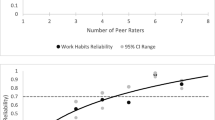Abstract
BACKGROUND: Although peer assessment holds promise for assessing professionalism, reluctance and refusal to participate have been noted among learners and practicing physicians. Understanding the perspectives of potential participants may therefore be important in designing and implementing effective peer assessment.
OBJECTIVE: To identify factors that, according to students themselves, will encourage or discourage participation in peer assessment.
DESIGN: A qualitative study using grounded theory to interpret views shared during 16 focus groups that were conducted by leaders using a semi-structured guide.
PARTICIPANTS: Sixty-one students in Years 1, 3, and 4 in 2 mid-western public medical schools.
RESULTS: Three themes students say would promote or discourage peer assessment emerged: personal struggles with peer assessment, characteristics of the assessment system itself, and the environment in which the system operates. Students struggle with reporting an unprofessional peer lest they bring harm to the peer, themselves, or their clinic team or work group. Who receives the assessment and gives the peer feedback and whether it is formative or summative and anonymous, signed, or confidential are important system characteristics. Students’ views of characteristics promoting peer assessment were not unanimous. Receptivity to peer reports and close positive relationships among students and between students and faculty mark an environment conducive to peer assessment, students say.
CONCLUSIONS: The study lays a foundation for creating acceptable peer assessment systems among students by soliciting their views. Merely introducing an assessment tool will not result in students’ willingness to assess each other.
Similar content being viewed by others
References
Arnold L. Assessing professional behavior: yesterday, today, and tomorrow. Acad Med. 2002;77:502–15.
Arnold L, Stern DT. Content and context of peer assessment. In: Stern DT, (ed.) Measuring Medical Professionalism. London: Oxford University Press; 2005:(forthcoming).
Montgomery BM. An interactionist analysis of small group peer assessment. Small Group Behav. 1986;17:19–37.
Small PA, Stevens CB, Duerson MC. Issues in medical education: basic problems and potential solutions. Acad Med. 1993;68(suppl):89S-98S.
Hundert EM, Douglas-Steele D, Bickel J. Context in medical education: the informal ethics curriculum. Med Educ. 1996;30:353–64.
Ginsburg S, Regehr G, Hatala R, et al. Context, conflict, and resolution: a new conceptual framework for evaluating professionalism. Acad Med. 2000;75(suppl):6S-11S.
Ramsey PG, Wenrich MD, Carline JD, et al. Use of peer ratings to evaluate physician performance. JAMA. 1993;269:1655–60.
Norcini JJ. Peer assessment of competence. Med Educ. 2003;37:539–43.
Arnold L, Willoughby L, Calkins V, et al. Use of peer evaluation in the assessment of medical students. J Med Educ. 1981;56:35–42.
Linn BS, Arostegui M, Zeppa R. Performance rating scale for peer and self-assessment. Br J Med Educ. 1975;9:98–101.
Thomas PA, Gebo KA, Hellmann DB. A pilot study of peer review in residency training. J Gen Intern Med. 1999;14:551–4.
Van Rosendaal GMA, Jennett PA. Resistance to peer evaluation in an internal medicine residency. Acad Med. 1992;67:63.
Rennie SC, Crosby JR. Students’ perceptions of whistle blowing: implications for self-regulation. A questionnaire and focus group survey. Med Educ. 2002;36:173–9.
Friedson E. Profession of Medicine; a Study of the Sociology of Applied Knowledge. New York: Dodd, Mead, and Co.; 1970.
Morgan DL. The Focus Group Guidebook: Focus Group Kit 1. Thousand Oaks: Sage Publications; 1998.
Glaser BG, Strauss AL. The Discovery of Grounded Theory: Strategies for Qualitative Research. New York: Aldine De Gruyter; 1999.
Inui T. The Flag in the Wind: Educating for Professionalism in Medicine. Washington, DC: Association of American Medical Colleges; 2003.
Papadakis MA, Hodgson CS, Teherani A, Kohatsu ND. Unprofessional behavior in medical school is associated with subsequent disciplinary action by a state medical board. Acad Med. 2004;79:244–9.
Author information
Authors and Affiliations
Corresponding author
Additional information
This project was funded in part by a National Board of Medical Examiners® (NBME®) Edward J. Stemmler, MD Medical Education Research fund grant. The project does not necessarily reflect NBME policy, and NBME support provides no official endorsement.
Rights and permissions
About this article
Cite this article
Arnold, L., Shue, C.K., Kritt, B. et al. Medical students’ views on peer assessment of professionalism. J GEN INTERN MED 20, 819–824 (2005). https://doi.org/10.1111/j.1525-1497.2005.0162.x
Received:
Revised:
Accepted:
Issue Date:
DOI: https://doi.org/10.1111/j.1525-1497.2005.0162.x




